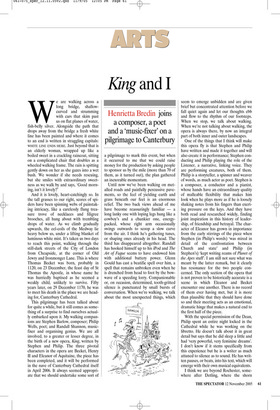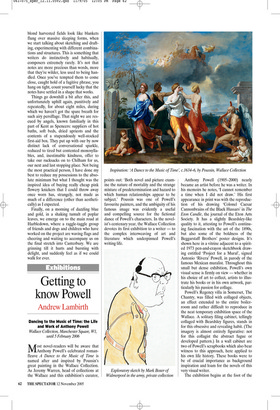King and I W e are walking across a long bridge,
shallowcurved and strumming with cars that skim past us on flat planes of water, fish-belly silver. Alongside the path that drops away from the bridge a fresh white line has been painted and where it comes to an end is written in straggling capitals: WHITE LINE ENDS HERE. Just beyond that is an elderly woman, wrapped up like a boiled sweet in a crackling raincoat, sitting on a complicated chair that doubles as a wheeled walking frame. The rain is spitting gently down on her as she gazes into a wet bush. We wonder if she needs rescuing, but she smiles with extraordinary sweetness as we walk by and says, ‘Good morning, isn’t it lovely?’ And it is lovely, heart-catchingly so. In the tall grasses to our right, scores of spiders have been spinning webs of painstaking intricacy, like a carelessly flung treasure trove of necklaces and filigree brooches, all hung about with trembling drops of water. As we climb gradually upwards, the eel-coils of the Medway lie heavy below us, under a lifting blanket of luminous white mist. It’s taken us two days to reach this point, walking through the still-dark streets of the City of London from Cheapside, at the corner of Old Jewry and Ironmonger Lane. This is where Thomas Becket was born, probably in 1120, on 23 December, the feast day of St Thomas the Apostle, in whose name he was hurriedly baptised as he seemed a weakly child, unlikely to survive. Fifty years later, on 29 December 1170, he was to meet his death in the place we are heading for, Canterbury Cathedral.
This pilgrimage has been talked about for quite a while, but it still comes as something of a surprise to find ourselves actually embarked upon it. My walking companions are Stephen Barlow, composer; Philip Wells, poet; and Randall Shannon, musicfixer and organising genius. We are all involved, to a greater or lesser degree, in the birth of a new opera, King, written by Stephen and Philip. The three pivotal characters in the opera are Becket, Henry II and Eleanor of Aquitaine, the piece has been completed, and it will be performed in the nave of Canterbury Cathedral itself in April 2006. It always seemed appropriate that we should undertake some sort of a pilgrimage to mark this event, but when it occurred to me that we could raise money for the production by asking people to sponsor us by the mile (more than 70 of them, as it turned out), the plan gathered an inexorable momentum.
Until now we’ve been walking on metalled roads and painfully percussive pavements, so the feel of yielding earth and grass beneath our feet is an enormous relief. The two back views ahead of me have become reassuringly familiar — a long lanky one with loping legs hung like a cowboy’s and a chunkier one, energypacked, whose right arm occasionally swings outwards to scoop a slow curve from the air. I think he’s gathering tunes, or shaping ones already in his head. The third has disappeared altogether. Randall has hooked himself up to his iPod and The Art of Fugue seems to have endowed him with additional battery power. Glenn Gould has cast a beatific spell over him, a spell that remains unbroken even when he is drenched from head to foot by the bowwave of a speeding lorry. Companionable or, on occasion, determined, tooth-gritted silence is punctuated by small bursts of conversation. When we’re walking, we talk about the most unexpected things, which seem to emerge unbidden and are given brief but concentrated attention before we fall quiet again and let our thoughts ebb and flow to the rhythm of our footsteps. When we stop, we talk about walking. When we’re not talking about walking, the opera is always there, by now an integral part of both inner and outer landscapes.
One of the things that I think will make this opera fly is that Stephen and Philip have written and made it together and will also create it in performance; Stephen conducting and Philip playing the role of the Listener, a narrative, linking voice. They are performing creatures, both of them. Philip is a storyteller, a spinner and weaver of words, as much actor as poet. Stephen is a composer, a conductor and a pianist, whose hands have an extraordinary quality of malleable flexibility that makes him look when he plays more as if he is loosely shaking notes from his fingers than exerting pressure on the keys. And they have both read and researched widely, finding joint inspiration in this history of leadership, of friendship and betrayal. The character of Eleanor has grown in importance from the early stirrings of the piece when Stephen (in Philip’s words) ‘was mired in detail of the confrontation between Church and state’ and Philip (in Stephen’s) ‘kept writing reams of Planet of the Apes stuff’. I am still not sure what was meant by the latter remark, but it clearly has resonance for the two people concerned. The only section of the opera that is not proven to be historically accurate is a scene in which Eleanor and Becket encounter one another. There is no record of them ever having met, but it is more than plausible that they should have done so and their meeting acts as an emotional, dramatic hinge that makes a natural end to the first half of the piece.
With the special permission of the Dean, Philip spent an entire night locked in the Cathedral while he was working on the libretto. He doesn’t talk about it in great detail but says that he did sleep a little and had ‘very powerful, very feminine dreams’. I don’t know if it stems specifically from this experience but he is a writer as much attuned to silence as to sound. He has written pauses, or beats, into his text, which will emerge with their own musical equivalents.
I think we are beyond Rochester, somewhere after Detling, where the shorn blond harvested fields look like blankets flung over massive sleeping forms, when we start talking about sketching and drafting, experimenting with different combinations and structures. This is something that writers do instinctively and habitually, composers extremely rarely. It’s not that notes are more precious than words, more that they’re wilder, less used to being handled. Once you’ve tempted them to come close, caught hold of a fugitive phrase, you hang on tight, count yourself lucky that the notes have settled in a shape that works.
Things go downhill a bit after this, and unfortunately uphill again, punitively and repeatedly, for about eight miles, during which we haven’t got the spare breath for such airy persiflage. That night we are rescued by angels, known familiarly in this part of Kent as Spencers: suppliers of hot baths, soft beds, dried apricots and the contents of a stupendously well-stocked first-aid box. They put up with our by now distinct lack of conversational sparkle, reduced to tired but contented monosyllables, and, inestimable kindness, offer to take our rucksacks on to Chilham for us, our next and last stopping place. Not being the most practical person, I have done my best to reduce my possessions to the absolute minimum but what I thought was the inspired idea of buying really cheap pink flowery knickers that I could throw away once worn has, strangely, not made as much of a difference (other than aesthetically) as I expected.
Finally, on a morning of dazzling blue and gold, in a shaking tumult of poplar leaves, we emerge on to the main road at Harbledown, where a raggle-taggle group of friends and dogs and children who have worked on the project are waving flags and cheering and waiting to accompany us on the final stretch into Canterbury. We are grinning till it hurts and bursting with delight, and suddenly feel as if we could walk for ever.




























































 Previous page
Previous page